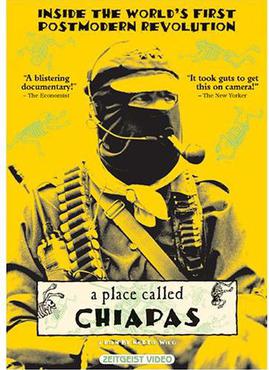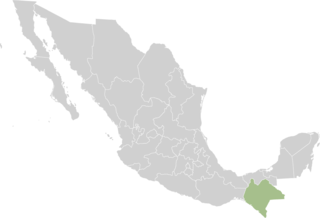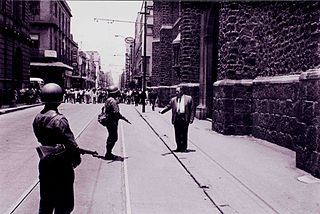
The written history of Mexico spans more than three millennia. First populated more than 13,000 years ago, central and southern Mexico saw the rise and fall of complex indigenous civilizations. Mexico would later develop into a unique multicultural society. Mesoamerican civilizations developed glyphic writing systems, recording the political history of conquests and rulers. Mesoamerican history prior to European arrival is called the prehispanic era or the pre-Columbian era. Following Mexico's independence from the Spanish Empire in 1821, political turmoil wracked the nation. France, with the help of Mexican conservatives, seized control in the 1860s during the Second Mexican Empire but was later defeated. Quiet prosperous growth was characteristic in the late 19th century but the Mexican Revolution in 1910 brought a bitter civil war. With calm restored in the 1920s, economic growth was steady while population growth was rapid.

The Zapatista Army of National Liberation, often referred to as the Zapatistas, is a far-left political and militant group that controls a substantial amount of territory in Chiapas, the southernmost state of Mexico.
Pietro Ameglio is a Uruguayan-born naturalized Mexican citizen and Gandhian civil rights and peace activist best known for his role in promoting nonviolence and creating a movement for peace and anti-militarism in Mexico.

The military history of Mexico encompasses armed conflicts within that nation's territory, dating from before the arrival of Europeans in 1519 to the present era. Mexican military history is replete with small-scale revolts, foreign invasions, civil wars, indigenous uprisings, and coups d'état by disgruntled military leaders. Mexico's colonial-era military was not established until the eighteenth century. After the Spanish conquest of the Aztec Empire in the early sixteenth century, the Spanish crown did not establish on a standing military, but the crown responded to the external threat of a British invasion by creating a standing military for the first time following the Seven Years' War (1756–63). The regular army units and militias had a short history when in the early 19th century, the unstable situation in Spain with the Napoleonic invasion gave rise to an insurgency for independence, propelled by militarily untrained, darker complected men fighting for the independence of Mexico. The Mexican War of Independence (1810–21) saw royalist and insurgent armies battling to a stalemate in 1820. That stalemate ended with the royalist military officer turned insurgent, Agustín de Iturbide persuading the guerrilla leader of the insurgency, Vicente Guerrero, to join in a unified movement for independence, forming the Army of the Three Guarantees. The royalist military had to decide whether to support newly independent Mexico. With the collapse of the Spanish state and the establishment of first a monarchy under Iturbide and then a republic, the state was a weak institution. The Roman Catholic Church and the military weathered independence better. Military men dominated Mexico's nineteenth-century history, most particularly General Antonio López de Santa Anna, under whom the Mexican military were defeated by Texas insurgents for independence in 1836 and then the U.S. invasion of Mexico (1846–48). With the overthrow of Santa Anna in 1855 and the installation of a government of political liberals, Mexico briefly had civilian heads of state. The Liberal Reforms that were instituted by Benito Juárez sought to curtail the power of the military and the church and wrote a new constitution in 1857 enshrining these principles. Conservatives comprised large landowners, the Catholic Church, and most of the regular army revolted against the Liberals, fighting a civil war. The Conservative military lost on the battlefield. But Conservatives sought another solution, supporting the French intervention in Mexico (1862–65). The Mexican army loyal to the liberal republic were unable to stop the French army's invasion, briefly halting it in with a victory at Puebla on 5 May 1862. Mexican Conservatives supported the installation of Maximilian Hapsburg as Emperor of Mexico, propped up by the French and Mexican armies. With the military aid of the U.S. flowing to the republican government in exile of Juárez, the French withdrew its military supporting the monarchy and Maximilian was caught and executed. The Mexican army that emerged in the wake of the French Intervention was young and battle tested, not part of the military tradition dating to the colonial and early independence eras.

Mexico, officially the United Mexican States, is a country in the southern portion of North America. It is bordered to the north by the United States; to the south and west by the Pacific Ocean; to the southeast by Guatemala, Belize, and the Caribbean Sea; and to the east by the Gulf of Mexico. Mexico covers 1,972,550 km2, making it the world's 13th-largest country by area; with a population of over 126 million, it is the 10th-most-populous country and has the most Spanish speakers. Mexico is organized as a federal republic comprising 31 states and Mexico City, its capital. Other major urban areas include Monterrey, Guadalajara, Puebla, Toluca, Tijuana, Ciudad Juárez, and León.
Drug war(s) may refer to:

A Place Called Chiapas is a 1998 Canadian documentary film of first-hand accounts of the Ejército Zapatista de Liberación Nacional (EZLN) the and the lives of its soldiers and the people for whom they fight. Director Nettie Wild takes the viewer to rebel territory in the southeastern Mexican state of Chiapas, where the EZLN live and evade the Mexican Army.
Land and liberty or land and freedom may refer to:

Neozapatismo or neozapatism is the political philosophy and practice devised and employed by the Zapatista Army of National Liberation, who have governed a number of communities in Chiapas, Mexico since the beginning of the Chiapas conflict. According to its adherents, it is not an ideology: "Zapatismo is not a new political ideology or a rehash of old ideologies. .. There are no universal recipes, lines, strategies, tactics, laws, rules or slogans. There is only a desire: to build a better world, that is, a new world."
Guerrilla movements in Colombia refers to the origins, development and actions of guerrilla movements in the Republic of Colombia. In the context of the ongoing Colombian conflict, the term 'guerrilla' is used to refer to left-wing movements, as opposed to right-wing paramilitaries.

The Chiapas conflict comprised the 1994 Zapatista uprising, the 1995 Zapatista crisis and ensued tension between the Mexican state and the indigenous peoples and subsistence farmers of Chiapas from the 1990s to the 2010s.
On January 1, 1994, the Zapatista Army of National Liberation (EZLN) coordinated a 12-day Zapatista uprising in the state of Chiapas, Mexico in protest of the enactment of the North American Free Trade Agreement. The rebels occupied cities and towns in Chiapas, releasing prisoners and destroying land records. After battles with the Mexican Army and police, a ceasefire was brokered on January 12. Around 300 people were killed.

Rafael Sebastián Guillén Vicente is a Mexican insurgent, the former military leader and spokesman for the Zapatista Army of National Liberation (EZLN) in the ongoing Chiapas conflict, and a prominent anti-capitalist and anti-neoliberal. Widely known by his initial nom de guerreSubcomandante Insurgente Marcos, he has subsequently employed several other pseudonyms: he called himself Delegate Zero during the Other Campaign (2006–2007), and since May 2014 has gone by the name Subcomandante Insurgente Galeano, which he adopted in honor of his fallen comrade Jose Luis Solis Lopez, his nom de guerre being Galeano, aka "Teacher Galeano". Marcos bears the title and rank of Subcomandante, as opposed to Comandante, because he is under the command of the indigenous commanders who constitute the EZLN's Clandestine Revolutionary Indigenous Committee's General Command.
The war on drugs is a United States government campaign against illegal drug trade.

The Mexican Dirty War was the Mexican theater of the Cold War, an internal conflict from the 1960s to the 1980s between the Mexican PRI-ruled government under the presidencies of Gustavo Díaz Ordaz, Luis Echeverría and José López Portillo, which were backed by the US government, and left-wing student and guerrilla groups. During the war, government forces carried out disappearances, systematic torture, and "probable extrajudicial executions".
Anti-clericalism in Latin America sprang up in opposition to the power and influence of the Catholic Church in colonial and post-colonial Latin America.
The military history of North America can be viewed in a number of phases.
The Chinese Revolution can refer to:

In political science, the term class conflict identifies the political tension and economic antagonism that exist among the social classes of society, because of socioeconomic competition for resources among the social classes, between the rich and the poor. In the political and economic philosophies of Karl Marx and Mikhail Bakunin, class struggle is a central tenet and a practical means for effecting radical sociopolitical changes for the social majority, the working class.








